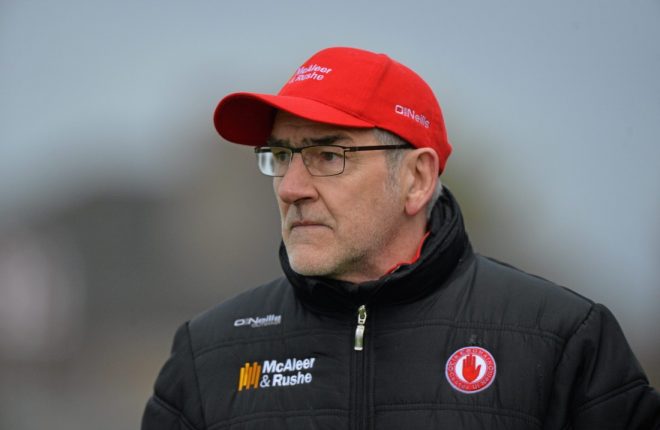
Mickey Harte is a manager who understands the difference between goals and purpose
Some teams, by belief or perception, are born to be champions.
Kerry and Dublin, for example, are seen as perennial favourites for the All Ireland football title, as is Kilkenny in hurling.
Similarly Crossmaglen for two decades have cultivated the ‘Cross way’ earning them the best club team in history badge.
Clan na Gael and Carrickcruppin were similar in the 70s, 80s, as were Harps and Ceide in the 40s/50s. In Derry it’s Ballinderry, in Monaghan it’s Scotstown, Clontibret or Castleblayney.
Arsenal, Manchester United and Tottenham for decades are the ‘Champion teams of English football as were Bolton long ago and Liverpool recently.
Mickey Harte’s ‘purpose’ is to win every title, every game even though his goals are specific targets and like all the teams mentioned above they might not win every title, yet they are still seen as champions regardless.
Thus, are ‘goals’ the same as ‘purpose’? Does one lead to another? Do either require the other?
A ‘goal’ is the object of your ambition or effort. It’s something you want done, to achieve, to receive. You can have one, lots or no goals at all. Goals are not always of your making either as you can be manipulated or influenced to take on a goal, even forced to.
A ‘purpose’ is the reason for your existence in sport, work and life. Working backwards, this implies in sport, work and life you must have a purpose, like Kerry, Dublin, Cross’, Kilkenny, etc. Purpose can’t be chosen or forced on you, it just is. ‘Is’ in sport translates as to be champions.
Even with no goals, you must have a purpose, but not everyone or every team is clued in to their purpose. Goals may/may not support your purpose, in fact they may work against your purpose.
Purpose and goals are similar, interlinked but difficult to tell the difference. A main difference is the time factor. People set ‘deadlines’ on goals but ‘deadlines’ are not applicable to a purpose.
’Goals’ are what you wish to achieve while ‘purpose’ is the reason one/team aims to achieve a goal, eg, win the All Ireland to be champions (purpose) requires goals set to achieve it or get there. ‘Goals’ change, purpose doesn’t, eg, Mickey Harte wants to win every game.
‘Purpose’ is directly influenced by the values and beliefs held by anyone/any team and is deep-rooted in that person/team and central to the life of that person/team (sport and life).
‘Goals’ can be measured yet ‘purpose’ cannot. The end result can be seen in goals, but is not that visible in purpose, eg, Kerry’s display in this year’s All Ireland final, Cross’ last year against Omagh in the Ulster Championship, but they certainly returned this year to their purpose – the Cross – to date.
Goals have a specific target (long, short), but purpose is a constant inner feeling of what the person/team ‘is’.
Purpose is a fundamental need of the person/team (to be the best) and so gives meaning to that person/team’s actions. Ultimately, behind all goals there is a purpose.
Setting goals without knowing your purpose is a fruitless unfulfililng exercise. Focusing on ‘goals’ rather than ‘purpose’ is hugely common in the world as is ignoring ‘purpose’ altogether.
If goals stand in the way of fulfilment of your purpose, they have to go and they can go as they’re not required.
Going ‘goal-free’ however, is to be avoided as ‘goals’ have a way of focusing your mind. So, if you mindfully choose goals that support your purpose, your sport/life becomes smoother and more satisfying.
It’s important to remember that your purpose is happening right now. It’s true your purpose unfolds into the future, eg, the ongoing journey to become champions ‘year on year’ but the present moment is the only one you control.
Goals, however, are only ever in the future. If a goal is accomplished in the present, it ceases to exist as it’s been achieved. Achievement is great and as it takes the ‘goal’ out of the picture it returns your focus to your purpose.
Mickey Harte, Ulster’s most successful All Ireland manager with three titles, has ensured his team Tyrone are seen constantly as a top-table team in line for honours because of his stated purpose of ‘wanting to win every game’.
Joe Kernan after three All Ireland club titles produced Armagh’s first All Ireland County title and during his reign Armagh stayed as a top-table county team. Joe’s purpose, seen in his record at club, county, province and country, was/is to be ‘champion’ of every competition his team enters.
Kieran McGeeney, plus all the other 2002 members of Joe’s team involved in Armagh’s Senior, U21, Minor and County academy teams, do so because Joe’s purpose of a ‘being the best one can be’ champion team still lives within them.
Purpose or Goal? I would contend that teams who know their purpose and seek constantly to fulfill it have more chance of success than those teams who have no purpose or have forgotten it and only set goals.
Receive quality journalism wherever you are, on any device. Keep up to date from the comfort of your own home with a digital subscription.
Any time | Any place | Anywhere











